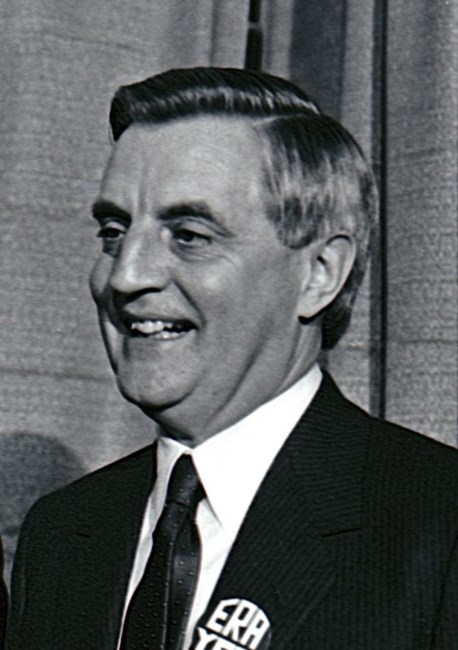
AVIS DE DÉCÈS
Walter F. Mondale
5 janvier 1928 – 19 avril 2021

After confirming his death, his family released a statement calling the Fair Housing Act of 1968 “one of his proudest—and hardest fought—achievements.”
Born on Jan. 5, 1928, in the hamlet of Ceylon in Southern Minnesota, Mondale was the son of a farmer and Methodist minister and a musician and piano teacher.
Known by his nickname “Fritz,” he spent high school more focused on football than academics but worked his way through Macalester College in St. Paul. He graduated with a political science degree from the University of Minnesota in 1951.
As a young man, Mondale shared the political views of his father and joined the Minnesota Democratic-Farmer-Labor Party, where he worked for and grew close with Hubert Humphrey, who was another future vice president and presidential hopeful.
After serving two years in the Army, Mondale returned to the University of Minnesota for law school and practiced law until 1960. He was then asked to fill the state’s attorney general seat at age 32. Mondale would go on to win two attorney general elections and by 1964 headed committees at the Democratic National Convention.
When Lyndon Johnson won the 1964 election, with Humphrey as his VP, Mondale filled Humphrey’s Minnesota Senate seat.
While serving 12 years in the Senate, Mondale was a big supporter of Johnson’s Great Society policies, including the Voting Rights Act of 1965 and the Fair Housing Act. Mondale also advocated for other liberal programs in education, health care and desegregation, and made it easier for the Senate to cut off a filibuster with 60 votes instead of a two-thirds vote.
In the mid-’70s, Mondale started to eye a presidential run, and in 1976 presidential candidate Jimmy Carter asked Mondale to be his vice president.
As vice president, Mondale worked on Middle East peace negotiations, ratification of the Panama Canal treaty, resettling Vietnam War refugees and advocating for affirmative action.
After leaving the White House in 1980, Mondale returned to practicing law as he prepared for another run at the presidency. Then in 1984, he secured the Democratic nomination, beating out Colorado Sen. Gary Hart. Mondale also made history when he selected New York Rep. Geraldine Ferraro as his running mate, making her the first woman to appear on a major party ticket.
Unfortunately for Mondale, President Ronald Reagan’s popularity was sky-high, and Mondale received only 40% of the popular vote. The only electoral votes he picked up were from his home state of Minnesota and Washington, D.C.
Mondale once again returned to practicing law and also taught as a fellow at the Hubert H. Humphrey Institute at the University of Minnesota.
In 1992, he returned to government work when President Bill Clinton appointed him U.S. ambassador to Japan. And then, in 1998, he was named special envoy to Indonesia.
In 2002, Mondale was unexpectedly asked to run for Senate in Minnesota after the incumbent Democrat, Paul Wellstone, died in a plane crash 11 days before the election. Mondale lost to Republican Norman Coleman.
Mondale is survived by his sons, Theodore, who ran unsuccessfully for governor of Minnesota in 1998, and William, a lawyer; four grandchildren; and two step-granddaughters.
Montrez votre soutien
Envoyez Vos
Condoléances
Partager
L'avis De Décès
Obtenir les mises à jour
Partager l'avis de décèsPARTAGER
- RECEVOIR DES RAPPELS
v.1.18.0